FutureSheLeaders (12)
Naheed Farzin – a sixteen-year-old girl from the quiet slopes of Malistan – has journeyed from the classrooms of Kabul to those of Quetta with hope, pride, and power. An outstanding student and a devoted teacher to the cause of knowledge, she helped form the Galaxy group, runs across the football field, and lights the horizon of tomorrow with the torch of education.
Her story is the story of a generation that soars beyond the towering walls of limitation, untangling the knots of limiting beliefs with the fingers of learning and awareness, transforming them into vibrant, empowering convictions.
Let us watch, listen to, and be inspired by this journey.
Royesh: Nahid Jan, hello. Welcome to FutureSheLeaders.
Nahid: Hello, sir. I hope you’re well and healthy. Thank you – wishing you a good day!
Royesh: From Malistan to Quetta in Pakistan is a long journey. But I want to see that distance beyond geography – inside the culture, inside the inner world of a girl named Nahid. Where do you see the real difference?
Nahid: I didn’t live in Malistan for long, but on my short visits there, I truly saw its beauty. And I don’t just mean the beauty of its mountains and fields. I was born in a place that may seem very traditional and simple – yet it was full of hope, full of love, full of self-respect, respect for learning, and respect for family values.
For me, these are the foundations of a good and successful society. If I speak of Kabul, the city where I grew up, it too was a world of hope – no less than Malistan. Kabul was where I grew, where I began to blossom, where I built the world of my dreams. It was there I decided I must become the Nahid I truly want to be. Quetta, on the other hand, has given me many opportunities. I have grown here too – but here, I think more about survival than blossoming. In Kabul, my mind was nourished by hope and by love. Here, it has been fed by the hardships of migration. Because we cannot escape the truth – and the truth is: this migration defines us. My mind here has been shaped more than anything by the bitter struggles of living in exile.
Royesh: Today, as I went through the list of FutureSheLeaders, I saw your name as the fifth girl from Malistan to be included. I found it interesting about these girls from Malistan that they appear one after another, from different places, in the FutureSheLeaders list.
Nahid: I think Malistan is a community where positive thinking grows naturally. Not only in my own family – which is highly educated – but in most of our families, I see the same outlook: a deep respect for knowledge and for intellectual growth. Wherever I look in Malistan, I find this positive mindset toward learning and development. Maybe that’s why they encourage their daughters to seek education, to study, and to learn.
Royesh: There is a woman from Jaghori who has left a lasting impact on so many people. I don’t know if she has influenced you as well -Dr. Sima Samar. Yes – absolutely. Dr. Sima Samar is a figure who has made a positive impact not only in Hazarajat, not only on women, but across the whole world. She can truly be a role model for women today who want to become the leaders of tomorrow. Her persistence, her tireless efforts, the goals she set for herself – and the way she achieved them – it all deeply inspires me.
Royesh: And for you, personally – how much have you been influenced by Sima Samar?
Nahid: Personally, when I heard her stories, when she came to our Empowerment sessions, I was deeply moved. It amazed me – how can a person be so unbreakable? Despite all the hardships she faced, there was so much about her that inspired me. But what drew me most, and the quality I loved the most, was that unbreakable spirit. She faced enormous challenges, yet she never lost hope, she never stopped trying – and she reached the dreams she had set for herself. That’s how she became the Sima Samar we know today.
Royesh: Another woman from Malistan, famous in a different way – through art – became a symbol of resistance and courage: Abi Mirza. What do you know about her? What have you heard? As Nahid, as a woman, as a girl – how often does her image return to your mind? Do you feel her voice, her resistance, her message carry something you must keep in your memory?
Nahid: Yes. Abi Mirza has truly influenced my life. She lived in a society where even speaking for a girl was considered a sin – a crime. But she began to sing.
And for that, she was accused by her own community, even imprisoned – yet she never stayed silent. What moves me most about Abi Mirza is that she never accepted silence. The one thing I hate is staying silent in the face of injustice or false accusations. She never gave up her art, never abandoned her purpose. Her own people accused her, her own people sent her to prison – but she still refused to be silent.
The voice she carried in her heart she expressed through her art – music. From Abi Mirza, I learned this: a person must never be silent. You must speak – you must let your voice be heard, in whatever way you can. Abi Mirza is a powerful example for Hazara girls today.
Royesh: What is the last image of Malistan that remains in your mind?
Nahid: Since I spent my childhood there, Malistan, in my memory, is a green and beautiful place, with fresh, clean air. The picture I hold in my mind is me in the yard of our home, with a small stove burning, and my friends around me. We played together there, far from the worries of the world – never thinking about what problems we might face, what hardships might come. That last image in my mind is the world of my childhood in Malistan.
Royesh: In your family, what person – or what thing – encouraged you the most to study and learn? Although all my family members and relatives encouraged me to continue my education, the people who most inspired me were my parents.
My father – he is educated himself, with a Master’s degree in Mathematics from abroad – was always my greatest supporter. Not only did he encourage me, he stood behind me every step I took. Wherever I went, I felt my father and my family with me. He has been a powerful influence in my life, always urging me forward – not just in my studies, but in every area where I wanted to grow.
And my mother – with her prayers, her help, and her belief in me – has been just as important. Even though she grew up in a society that deprived her of so much, she made sure to give me what she herself was denied. She gave me freedom – so I could pursue my education without limits.
Royesh: Let’s go a little further back – I want to ask about your birth. Where and when were you born?
Nahid: I was born in 1388 in the Afghan calendar – which is 2009 – in the village of Mian-Kal, Malistan district, Ghazni province. I was fortunate to be born into a deeply religious, educated, and literate family. My grandfather was known for his piety and devotion, so he used the pen name Zahed.
That’s why our family name today is Zahedi – taken from his pen name. My mother is the daughter of one of Malistan’s influential Khans.
Royesh: I’d like to hear more about your parents and your family. What is one thing about your family life that you think would interest your audience?
Nahid: One thing I truly value in my family is that they have always encouraged me to learn. They have never made a distinction between me and my brother, just because he is a boy. My family taught me that being a girl is not a weakness – it is a strength. Through their actions and encouragement, they gave me the confidence to reach the place I am today. That has always been the thing I love most about my family.
Royesh: How old were you when you came to Kabul? And how old were you when you started school?
Nahid: I don’t remember exactly how old I was when we left Malistan for Kabul – maybe one year old, or one and a half, or two. When we came to Kabul, I was five years old when I entered kindergarten – and six years old when I started first grade.
Royesh: Which school did you attend? Where did you do your kindergarten and early primary classes?
Nahid: I started at Erteqa High School – one of the schools in Kabul. I began there at age five, in kindergarten, and studied up to seventh grade.
Royesh: Do you have a special memory from Erteqa School – with your classmates or teachers – that has stayed with you and feels very sweet?
Nahid: Since I completed my entire primary school there, most of my memories belong to my childhood. Every moment I spent in that school, every day I went there, became a memory for me.
For example, whenever I took first place in my class and was praised on stage by the principal and teachers – those moments became memories I cherished. Or when we played during recess with our teachers, the school principal, and classmates – all of those turned into beautiful memories for me.
Royesh: What is one special memory – maybe from a teacher or classmate – an incident or story that has stayed with you?
Nahid: It’s from my kindergarten year. On my very first day, I was shy and didn’t want to be away from my family. By midday, I told the teacher I wanted to go home. But our house was far from the school, and my teacher – rightly – said no. So I sat down and began to cry. My teacher tried hard to comfort me. She never once got angry. Instead, she brought a laptop
and played a cartoon for us. I wasn’t the only one – many of my classmates felt the same that day. That moment turned into a happy memory for me. It made me love school more. If my teacher had scolded me that day, maybe I would never have felt this much love for school. But because she showed kindness and patience, I saw school differently – not as a prison, but as a place to learn and discover good things.
From that day on, I looked forward to school every morning, wishing the sun would rise sooner so I could go back.
Royesh: Up to which grade did you study at Erteqa High School? And what grade were you in when the Taliban came?
Nahid: During all my time in Kabul, I studied at only one school – Erteqa High School. I completed up to seventh grade there. In fact, we were in seventh grade, taking our mid-year exams. Only one day was left – our Pashto exam – when the Taliban came and Kabul fell.
Royesh: For all Afghans – especially for girls – the fall of Kabul carries a very personal memory and feeling. I want to ask you: What did you feel when Kabul fell to the Taliban? What did that moment break inside you, and what did it awaken?
Nahid: The fall of Kabul is one of the bitterest memories for all Afghans – especially for women and girls. For me, it was the most painful event of my life. That day, we had our English exam – a subject I used to find difficult. When I finished and saw I had answered everything, I felt happy. At the time, the Taliban were already fighting in other provinces. Five years earlier, they had reached Malistan and Jaghori – so this time, no one believed they could reach Kabul and take the city. I didn’t believe it either.
When we left the exam hall, my classmates and I joked that maybe from now on we’d have to wear the burqa to school – not realizing how close it was to reality.
When I reached home, a strange unease came over me – as if something bad was about to happen. I remembered I had my Pashto exam the next day and started studying, memorizing vocabulary – when suddenly the news arrived: Kabul had fallen. I thought I was dreaming. Or maybe having a nightmare. But when I stepped onto our balcony and looked out over the city, I saw a bitter, unforgettable image: A mother running to bring her child home from school. A woman, anxious and rushing – perhaps from work, perhaps from school.
Kabul had fallen into a silence that carried screams in its heart. Part of the pain was knowing my country had fallen. Part of it was fear for my father, who still hadn’t returned home from his government job. I felt as if all my dreams for Kabul, all my hopes for building a better Afghanistan, were crumbling before my eyes. A lump rose in my throat, and all I wanted was to find a place and scream.
Royesh: I want to repeat the last part of my question. With the Taliban’s return and the fall of Kabul you just described – what did it break inside you, and what did it awaken?
Nahid: When Kabul fell, for the first time I felt that all my dreams had been destroyed, all my hope shattered. I thought I would have to bury every dream I had – because now, living as a girl in Afghanistan would be so much harder.
With the fall of Kabul, one Nahid broke, and another Nahid awoke. The Nahid who had built dreams for her homeland, dreams for her future here – she broke. Her hopes and wishes collapsed inside her. But another Nahid rose – stronger than before. That Nahid told herself: If I was strong in the past when I had opportunities, then now, with all these restrictions, I must stand even stronger. I must stand even firmer.
Royesh: The Nahid who broke before the Taliban, and the Nahid who awoke – has now faced the Taliban for four years. When you think about the Taliban today, what is the most important thought that comes to your mind – the one you want to share with your special audience in Afghanistan and around the world?
Nahid: The first thing that comes to my mind is wondering how a human being can reach a point where they do the things the Taliban are doing now.
But I also think the Taliban are people who need help – help to change their way of thinking. To tell them: “No – the world is not the way you see it. See the world with a better mindset, and maybe it will look more beautiful to you.”
Royesh: In FutureSheLeaders, I’ve asked many girls this question – and I’d like to ask you as well, though in different words: What special feeling does being a girl – especially being a girl in Afghanistan – create for you?
Nahid: Being a girl in Afghanistan means love, hope, and strength. At the same time, it comes with its own hardships. When you’re a girl here, you have to fight even for your smallest right – like the right to education.
To truly understand what it means to be an Afghan girl, you must be one and live in Afghanistan yourself. Yes – it has its difficulties, but it also has its beauty. Afghan girls are incredibly brave and fearless. Even when restrictions are placed on them, they remain unbreakable. They keep going.
Royesh: Have you ever thought that being a girl is a special kind of being human – something quite different from being a boy?
Nahid: Yes. Being a girl is its own unique way of being human. The first difference I see is in the way we think – our vision. A girl may look at the world from one perspective, while a boy may see it from another.
Royesh: Can you explain this a bit more? When you say the difference is in vision, what exactly do you mean?
Nahid: For example – a girl often feels toward another person: “This is part of my being.” But a man might feel toward a person: “This is mine.” It’s a sense of ownership. While her sense is “part of my own being.”
Royesh: And what difference does that make – between an owning gaze and one that feels something as part of one’s being? How does it affect the way they treat things?
Nahid: When you see something as part of your being, you can never let it go – you can never abandon it. But when you see something with an ownership gaze, you can give it up and let it go.
Royesh: In your own experience as Nahid, when you compare yourself with boys, do you feel that in the way you deal with people around you -or even with things connected to people- you are different from them?
For example, do you feel more careful and attentive than boys? Do you find boys to be more careless than girls, or at least than you?
Nahid: Yes – you could say more indifferent. Girls tend to be more sensitive about certain things, noticing even small details. Boys, on the other hand, may be indifferent to many things that, in reality, are actually quite important.
Royesh: What challenges did migration to Pakistan bring for you? Did you ever feel that in Pakistan you encountered a new concept – something called rootlessness or being without a homeland?
Nahid: As I mentioned before, migration has had both positive and negative effects on me. And about rootlessness – I didn’t just encounter it, I tasted its bitterness. When a person is in their homeland, their roots feel strong. They believe they are in a safe place. But when you are a migrant, today you may be here – yet you don’t know where you will be tomorrow. That uncertainty is a deeply bitter feeling.
Royesh: Many Hazaras say, “In our own homeland, we never truly felt it was our homeland. Afghanistan was never really home to us.” When you came to Quetta, did you feel that – that you had no homeland in Afghanistan, and now you are without one here too?
Nahid: In Afghanistan, even though Hazaras have suffered greatly and faced much injustice, still – one’s homeland is one’s homeland, no matter the hardships. When I came here, I truly came to understand the meaning of being without a homeland. I realized that it doesn’t matter where you are geographically – in a “better” place or a “worse” one – nowhere can be the same as your own homeland.
As a child, I often heard people say this – even those who had migrated from advanced countries like Australia – they would say, “There is no place like your homeland.”
Back then I wondered, “How can that be? What if the new place is safer, or a hundred times better than Afghanistan?” But when I migrated myself, I understood: truly, no place can be like your own homeland.
Royesh: Tell me about your connection with Cluster Education and the Empowerment programs. What memories do these two names bring to you?
Nahid: When I first heard the name Cluster Education, it was completely unfamiliar to me. But once I understood its meaning – not just the literal meaning, but what it truly represents -I felt it deeply. It goes far beyond learning to read and write. Far beyond school.
The Education we experienced in Cluster Education comes with the full spirit of the program: We are a group of girls, united by our hunger to learn, completing each other, working together for a better Afghanistan and a brighter future.
Royesh: Have you ever considered being first in your class as a real success?
Nahid: When I was younger – yes. Because when you are small, your dreams are also small. Back then, my greatest success was being first in my class, or first in the whole school. When I achieved that, I felt I had reached something very big. But as I grew older, success took on a much broader meaning for me – beyond being top of the class.
Now, if I do come first, I see it simply as a positive result of my effort and hard work – but not the ultimate success. Today, success for me means reaching higher goals – not only growing myself, but also lifting someone else with me, helping them rise too.
Royesh: For anyone – especially those who work tirelessly – there can come a moment when they say, “That’s it. I’ve had enough.” Have you ever reached such a point?
Nahid: No – I haven’t reached a point where I said, “Enough.” Because I’ve always had a reason to continue, a dream to pursue, and paths still open ahead of me. Yes – there were times when I felt something was beyond my ability, when my efforts didn’t bring results, or when they weren’t recognized.
But each time, I reminded myself: I still have a reason to go on, I still have dreams to reach, I still have roads to walk. So I never said, “That’s enough.”
Royesh: One of the first lessons in Empowerment is a beautiful sentence that says: “All your dreams can come true – if you have the courage to follow them.” I want to hear what this means in your own life experience.
Nahid: Yes – this is one of my favorite sentences that I first heard in Empowerment. All dreams are achievable, if we have the courage to pursue them. I’ve truly experienced this in my own life.
When I’m on the path toward my dreams, and sometimes I feel tired, I remind myself of this truth: Every dream can come true – if I have the courage to follow it. And I remind myself that I am standing on a path I built myself, and every step I take forward is one step closer to making my dreams real.
Royesh: Why does following a dream require courage?
Nahid: Because a dream is not a small thing. Everyone dreams, everyone has hopes – but only those who have the courage to follow them can reach them.
On the way to making a dream real, you might face limiting beliefs – thoughts that hold you back. If you don’t have the courage to turn those limiting beliefs into supporting beliefs, you lose right there.
That’s why a person needs courage – to remove limitations from their path, to change their vision toward those limits, so they can reach their dream. What is the most important lesson you learned from Empowerment – the one that gave you the most excitement and energy?
Nahid: Empowerment has taught me many lessons, all of them life lessons. But the very first lessons – about knowing yourself, finding your real self – were the most powerful for me. When I studied this, I truly stopped to ask myself: Who am I? Where am I? What is my dream? Where do I want to go?
I found the strength inside myself to believe that I must have the courage to follow the dreams I weave. And I found the inner power to make those dreams come true.
Royesh: How close are you to the mirror? Do you ever stand in front of it – especially looking into your own eyes? And when you do, what do you see there?
Nahid: For some people, a mirror is just a flat surface to check their face. But for me, it’s much more than that – it’s where you truly see yourself. When I stand before the mirror, sometimes I see unspoken truths. Without saying a word, I have a conversation with myself. In my eyes, I sometimes see hope, excitement, joy – and that gives me motivation.
Other times, I see traces of sadness or despair – but even then, I also see a hidden smile. I love the mirror because it’s an honest friend. It shows you exactly what you are: if you’re happy, it shows you happy; if you’re sad, it shows you sad.
Sometimes it delivers bitter truths in a harsh way – but those very truths push you to change yourself.
Royesh: Have you made it a habit – as an Empowerment exercise – to stand in front of the mirror in moments of both joy and sadness, and to truly love the mirror as the reflection of yourself?
Nahid: Yes – very much. Before joining Empowerment, I didn’t have such a deep meaning for the mirror. But now, when I’m happy, I stand in front of it and see a joyful girl – a girl who may have reached her dream, whose efforts have borne fruit, and in whose eyes I see a spark that is truly beautiful.
That gives me motivation and makes me stronger. And when I’m sad, I see someone who might feel hopeless – but still carries hope in her heart.
Yes – it has completely become a habit for me.
Royesh: You’ve said you love public speaking. What encouraged you to speak in front of an audience?
Nahid: I’ve always loved speaking – and that comes from both understanding and aspiration. I understood that if a person stays silent, others will create the story for them. Others will speak in their place – and that story might be false.
I realized that speaking is not just making a sound. It’s expressing the essence of your being and your identity. I also felt the pain that in our society, silence in a girl is too often mistaken for politeness. That made me determined to speak more instead of staying silent. And I have the hope that when I speak, maybe a girl – someone searching for light in the depths of darkness – will find that light in my words and feel hope again.
Royesh: As a teenage girl, when you speak in front of an audience – when you see many eyes fixed on you, waiting to hear what you say – what feeling comes alive inside you? It’s a mix of pride, honor, responsibility, power – and also fear. I feel proud because in that moment I’m standing there, and the eyes looking at me are the eyes of my family, my mother and father – looking with pride.
They are the eyes of my friends, also proud of me. And the eyes of a girl smiling at me – and I realize I’ve passed some of my courage to her, so she too can speak tomorrow. I feel a responsibility, knowing that my words are not just my own, but the voice of millions of girls who now live in silence.
I feel powerful because I’m standing in a place I once dreamed of being. But sometimes I also feel fear – because not all the eyes watching you while you speak want you to be in that position. Some belong to those who never wanted a girl to be there at all, who always wished girls would remain silent.
And yet – in that very moment – I speak. That’s when power and fear exist together inside me.
Royesh: Has there ever been a speech you gave where you felt the most comfortable and confident?
Nahid: Yes. One of my most confident and well-delivered speeches was at the graduation ceremony of Esteqlal High School. It was about the responsibilities of the new generation and the idea that graduation does not mean the end of learning.
Up to twelfth grade, you are a student – your teacher comes and teaches you, and you must learn the lesson. After that, you become a seeker of knowledge yourself, responsible for your own learning.
Another speech I’m proud of was on Hazara Culture Day, about Baba Mazari – one of the most prominent Hazara leaders. He had a dream: that being Hazara would not be a crime. And he truly reached that dream – today, being Hazara is not a crime.
Royesh: Many girls may be afraid of speaking in public. What advice would you give them?
Nahid: Speaking in public may bring some fear or anxiety at first – but we shouldn’t run away from our fears. We must face them. We must cross through them. Whatever you’re afraid of – do exactly that, and your fear will fade.
My first advice to these girls is to overcome their fear. Second – when you speak in public, say something you truly believe in, something you deeply trust yourself – because then you can deliver it better.
Also, start small – take small steps before moving to bigger ones. And always remember: silence is never a good choice. Speaking is always better than staying silent.
Royesh: As someone in FutureSheLeaders working to create a different kind of leadership – a feminine leadership – what opportunity does speaking give you to connect with the society you aim to lead?
Nahid: Speaking is truly an essential skill for leadership. If we claim we will be the leaders of tomorrow, we must be able to share the thoughts and ideas we carry within ourselves with our society.
For that, we need the skill of expression – the ability to speak clearly. Because a good leader is not only someone who thinks well, but also someone who can express those thoughts in a powerful and effective way.
Royesh: In the Peace on Earth Game, which group are you a member of, and what is the most important work you do in it?
Nahid: In the Peace on Earth Game, I’m a member of the Galaxy group. We created this group in December 2023 to promote peace and spread the message of peace in our community.
We’ve carried out many projects for this purpose – but our most successful project was creating literacy classes – or life literacy – for women in our community. These classes received unexpectedly strong support from them.
Royesh: So now you are also among those who take part in teaching women?
Nahid: Yes.
Royesh: Teaching these women and girls – especially those deprived of school – and standing before them at age 15 to teach, what feeling does that give you?
Nahid: It gives me a good feeling – a feeling of pride. But at the same time, there’s also a feeling of regret. When I see such talent in them at this age, I think – if opportunities hadn’t been taken from them, if they had been given the chances they deserved in the past, then today, each of them might be a graduate in an excellent field. And maybe today our society would be more enlightened.
Royesh: What is one of the best and happiest experiences you’ve had as a teacher?
Nahid: Teaching – especially in life literacy – gives you both happy and bittersweet experiences. One of the best for me was with a student who was quite elderly – maybe 70 years old – and whose eyesight was very weak.
Even when she sat in the front row, she couldn’t clearly see the board. She couldn’t keep up with the lesson volume I gave to others. Her learning pace was much slower.
For example, if others learned the alphabet in one day, she could only learn one letter – Alif (A). Honestly, I didn’t believe she would ever learn much. She was so weak in the beginningBut now, seeing how much she has learned is such a good feeling.
At least I was able to help someone who once couldn’t even see the board properly or hold a pen – and now, she can.
Royesh: With the teaching experience you now have, in the classes where women participate, how useful do you see literacy in changing their lives? What kinds of changes do you think literacy brings to women’s lives?
Nahid: As I mentioned earlier, literacy is not just about reading and writing. It has a deep impact on life – especially for the women we teach. Literacy changes their way of thinking, it builds their self-confidence, and it helps them achieve things they never thought they could. It even improves their ability to speak in public.
We have students who, at first, couldn’t speak in front of two or three women – and now, they stand and speak confidently in front of 300 or 400 people. That is the true impact of literacy on a woman’s life.
Royesh: In the Galaxy group, how many women students do you teach in total?
Nahid: In the Galaxy group, we teach 200 women.
Royesh: And how many people are in your group, including teachers and your administrative team?
Nahid: We are 6 members in our group – and we have 6 classes.
Royesh: I’ve heard you also play football – is that true?
Nahid: Yes.
Royesh: How did football become part of your life?
Nahid: I’ve loved football since childhood. I loved sports in general, but especially football. Sometimes I would watch football matches, even though I didn’t fully understand what they were doing on the field – but I was still fascinated. I admired some football players, but I never seriously pursued it myself.
When I joined Cluster Education, one of its side programs for girls was to start a football team. That brought me a sense of joy and excitement. It gave me the chance to fulfill one of my long-held dreams – to play football.
Royesh: What is it about football that attracts you the most?
Nahid: Football is exciting in every way. I love the teamwork – in futsal, for example, five players working together toward a common goal. That sense of playing as a team is special.
And then there’s the competition with the opposing team – it pushes you to run more, try harder, give your best. But what I love most about football is this: when you’re in the game, there’s no past to think about, no future to worry about.
There is only the present – you, the path to your goal, and the obstacles you must overcome to reach it. For me, that is the most powerful feeling football gives.
Royesh: When you look at sports in general – especially for girls – how do you think sports connect to the idea of freedom and liberation?
Nahid: In our society, sports mean freedom from limitations for girls. In other countries, girls may not face restrictions in sports – but here, sports truly represent breaking free. When you live in a traditional society, playing sports can be one of the hardest things to do.
It means breaking away from the grip of limitations, standing tall against challenges, and defying the unspoken rules society has written against you.
Royesh: On the football field, what role do you feel you play? Do you see yourself as a leader, a regular player, or a fighter?
Nahid: Often I feel like a leader – because sometimes one piece of advice can save the team, or one signal can control the game. Since I’ve often played that role, I mostly feel like a leader.
Royesh: And what about being a fighter? Do you ever feel a special energy that makes you want to push hard against your opponent?
Nahid: Yes – always. When you step into the field, you can’t be indifferent. There’s an energy inside you that drives you to push the ball toward the goal.
Royesh: Nahid, let’s return to you – to Nahid.
Nahid: Who is Nahid Farzin? Who chose your name? And if you were to introduce yourself in one sentence, what would you say?
Nahid: Both my first name and my last name were chosen by my father. The meaning I see in them is this: I am Nahid Farzin – my name comes from “light” and my surname from “dignity.” I am a girl who has come to shine in the darkness, to be the voice of thousands of silent girls, with a heart full of dreams and eyes set on tomorrow.
Royesh: What is the biggest dream you have for your future?
Nahid: My biggest dream is to be a voice for those who have never been heard – to restore the violated rights of women and remove the restrictions that have held back my society. Whether in the role of a lawyer, a politician, or a leader – my goal is to grow and flourish myself, while helping others grow and flourish too.
Royesh: What do you do specifically to make this dream come true?
Nahid: I’ve always tried to learn small skills and techniques that will help me reach my big dream. A person always starts with small steps to achieve big goals. I want to use these skills as a leader to share my ideas and vision with others.
Royesh: If you could go back and see the 7-or 8-year-old Nahid standing before you, what would you tell her?
Nahid: I’d tell her: “You are a very strong girl, and the dreams you have today will one day come true. Never be afraid of your thoughts and ideas. And I – your future self – am already proud of you.”
Royesh: What do hope and hopelessness mean to you on the two sides of life’s line?
Nahid: Hopelessness is like a shadow that sometimes falls on your path. Hope is the light that – even in the smallest spark – can brighten the way.
Royesh: Have you ever tasted hopelessness?
Nahid: Yes – many times. When you see your efforts bring no results, or when situations arise where you feel you can do nothing – sometimes hopelessness comes.
Royesh: Have you ever had an experience where, when you were hopeless, a practice, a friend, a book, a film, or a special event pulled you out of it?
Nahid: Yes. In my opinion, no one has helped me out of hopelessness mo re than I have helped myself.
Royesh: Let’s go back to the Empowerment practices and lessons. What does Empowerment really mean to you?
Nahid: As its definition says, Empowerment is the art that helps a person shape their life the way they want – the way they love. For me, Empowerment has been exactly that art. It has helped me build my life to my own will. Before, I sometimes worried about what others thought of me. Now, I believe I matter most – because it’s my life. Here, I matter.
I must discover my true self, my power, my dream, and my path. And in this, Empowerment has helped me greatly to walk that path with success.
Royesh: If someone came to you and said, “Nahid, in a society where religion, culture, and politics leave no place for women in leadership, don’t tire yourself out – don’t make a fool of yourself,” what would you say?
Nahid: I would say: Yes, it’s true – maybe we have lived in a society, even in a world, where leaders have almost always been men. But that’s not because women are weak or incapable. It’s because women have rarely been given the chance. Every government that has come, every unwritten law in society, has worked to limit women, to limit girls. If those opportunities had been given to us – and not taken away – many women could have been great leaders for society.
So no, I am not making a fool of myself or wasting my time. Because the generation that comes after me should not have to hear such words, should not have to face such limits. They are meant to shine.
Royesh: Some might say, “These dreams of yours are sweet – but unrealistic.
Your work is fine on a small scale: stay home, teach, lead small community groups. But politics? Politics is about leading the balance of power in society.
That’s far beyond your abilities. Women can’t achieve anything in that arena.” What would you say to that?
Nahid: I don’t think it’s beyond our reach at all. As I’ve said before, if opportunities are not taken away from us, we can enter politics and leadership just as well as anyone else.
If a woman had the same opportunities a man has in society, what could possibly stop her from reaching politics or leadership?
Royesh: They might say, “But those opportunities will never be allowed. Politics needs power – which you don’t have. Politics needs force – which you don’t have. Politics depends on leadership models passed down through heritage, religion, and deep-rooted cultural beliefs – and these are not in women’s favor. Even if you wanted to reach political leadership, the entire system would block your path.” What would you say then?
Nahid: We will create opportunities for ourselves within that very framework – within our faith, within our culture. Our dreams are never impossible, because they are built on reality, shaped by our past, and aligned with our ideals. They are absolutely achievable.
Royesh: Tell me about the limiting beliefs you’re struggling with these days, and how you deal with them.
Nahid: As I’ve said before, the situation for migrants around the world is not good right now – many are being deported. One limiting belief is the idea that because I am a migrant, I can’t progress as much as I want, or I can’t speak as freely as I’d like. But I choose not to see these challenges as “limitations.”
I see them as problems to be solved – and I start looking for solutions.
Royesh: Aside from migration, what other limiting beliefs do you face daily as a girl?
Nahid: The society we live in now – with its cultural and racial discrimination – is a big one. It’s a very traditional environment. Often, when we want to carry out a project, we’re not even given permission – even if it’s a charitable project. Something as simple as filming a short video on the street can be a huge struggle. These are all limiting beliefs in action – but I refuse to see them through the lens of limitation.
Royesh: What specific impact has education had on your growth as “Nahid”? For example, if there were no education, what would you have that could still make you feel empowered?
Nahid: Honestly, without education I wouldn’t be able to speak with this much confidence today. I wouldn’t be the same “Nahid.” The way I think, the way I reason – it all comes from education. Without it, I wouldn’t have any of these abilities.
To take away girls’ right to education is to cut off their future – to bury it alive. As a girl, I can’t even imagine being kept away from learning.
Royesh: In your view – and based on your personal experience – what special change does education bring to a girl’s mind and heart that makes her empowered and self-confident?
Nahid: Education brings so many positive effects to a girl’s life. Just as it has changed my own self – as I’ve shared before – it has transformed my confidence and my way of thinking. Education can turn a girl’s heart from fear to hope, and her mind from silence to awareness. And when a girl’s mind and heart are illuminated, no one can stop her.
Royesh: Imagine one day you become Afghanistan’s Minister of Education. What would be your very first action?
Nahid: If I ever became Minister of Education in such a time, my first act would be to remove all educational restrictions. I would open the doors of every school to all Afghan children – without ethnic discrimination, without gender discrimination, without labeling anyone as “girl” or “boy,” rich or poor. My first priority would be to eliminate every barrier, every slope and obstacle in their way. I would also restructure Afghanistan’s education system so that lessons on peace or nonviolence are not just memorized for exams – but are taught as real moral values. So that no one in Afghanistan would ever feel compelled to raise or train a Taliban again.
Royesh: What do your friends say about you? What qualities do they most appreciate?
Nahid: Most of the time, what I hear is that they value my persistence – that when I join something, like a program or a project, I don’t skip out or disappear; I keep going until I reach my goal.
Many of my friends also appreciate that I’m a good listener – that when someone needs to share their thoughts or open their heart, I am there to listen fully. These are the qualities they often tell me they admire.
Royesh: If one of your students – now standing before you as their teacher – were to describe you, what would they say?
Nahid: If they spoke from the perspective of a student, they might say “Our teacher is kind and patient. She makes no distinction between us – she sees us all the same. When we make mistakes, she doesn’t mock us; instead, she shows us better ways to learn.”
Royesh: Have the lessons and exercises from Empowerment and the Peace on Earth Game made your relationships with your family, your parents, and your surroundings more meaningful – or have they harmed them?
Nahid: Yes, they’ve made them more meaningful – because my family has always wanted me to reach higher levels of ability. When they see my activities in the Peace on Earth Game or hear my ideas, they truly feel happy. I sense that not only I, but they too, have reached their dream. Many of our Peace on Earth Game projects were done at our home, and my parents always encouraged us – not only me, but many members of our group as well.
Royesh: What color is the future world you imagine in your mind?
Nahid: The world I picture may have the color of a sunrise – after a very long, dark night. Perhaps it would be golden, after we have seen so much darkness. It would be a color of light, the color of reaching clarity. It would also have green – because not only I have grown, but many other girls have grown with me on this journey. And perhaps a touch of blue – the blue of freedom, because we have reached liberty and freed ourselves from all restrictions.
Royesh: In FutureSheLeaders we’ve set the age of 40 as your “graduation” – the point at which each of you should have become a leader. But in school, some graduate earlier than others. Some people finish school earlier than others. Now, if we look ahead-how does Nahid imagine herself at the age of 40? And if she chooses to become a leader earlier-at 30, 25, or 35-how does she see herself then? Both as Nahid the graduate and Nahid who has reached the position of leadership.
Nahid: I see Nahid as a woman who has achieved her dream of leadership. A woman who has not only grown herself, but helped many others grow with her. A woman who continues to work for a better future, so that the next generation can live well, and her country can have lasting peace. By then, her dreams will only have grown bigger and bigger.
Royesh: What is your final message to all the girls who are trapped in darkness now – yet still believe in the light?
Nahid: My message is this: You may be in a darkness so deep that even your own voice is unheard – even you cannot see yourself. But believe this – those who still believe in light while in darkness are themselves the light. Always try, instead of cursing the darkness, to light a candle there. And always keep moving on your path. Never stop. Because darkness will pass – maybe one day it will be gone – and you will remain. And when that day comes, strive to remain stronger, more beautiful, and more successful than ever.
Royesh: If you could choose a title for your story, what would it be?
Nahid: I would call it: “A Girl of Hope, Pride, and Power.”
Royesh: Thank you, Nahid, for sharing the story of your life and your dreams with us in FutureSheLeaders.
Nahid: You’re welcome, dear teacher.
Royesh: Thank you for giving your time, and for all the efforts you make for our future and the next generation.
Nahid: I am deeply grateful.

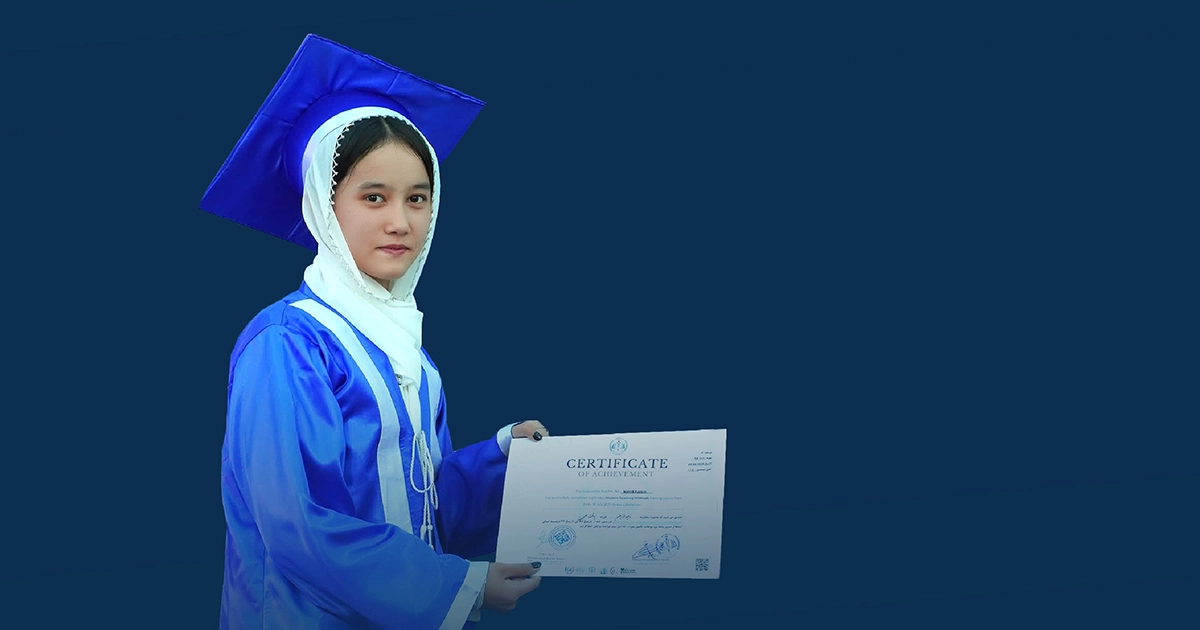
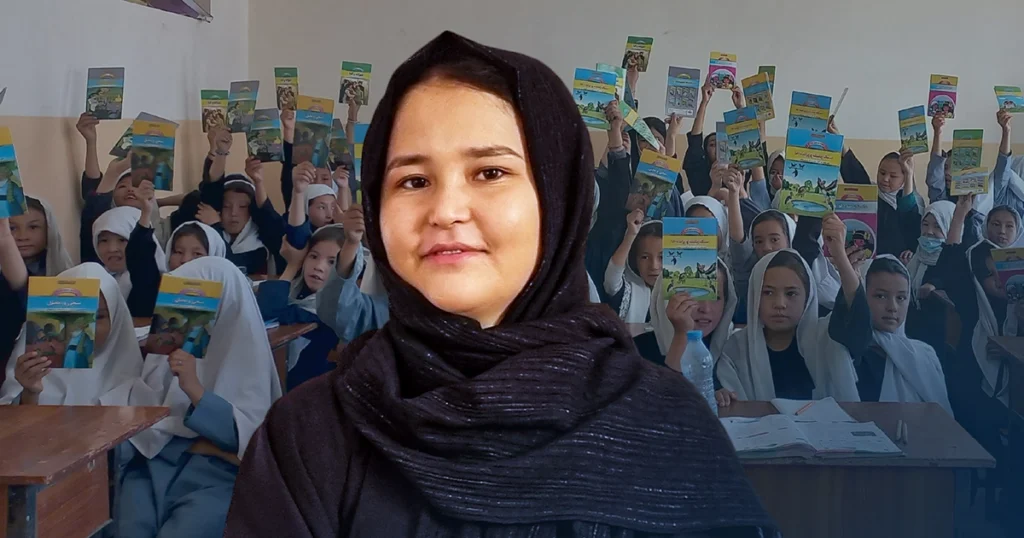
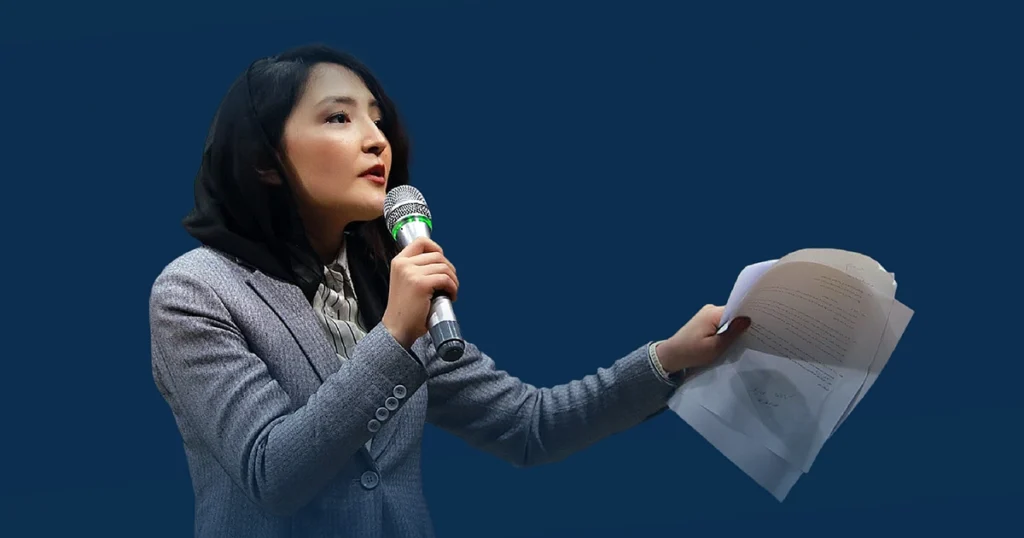
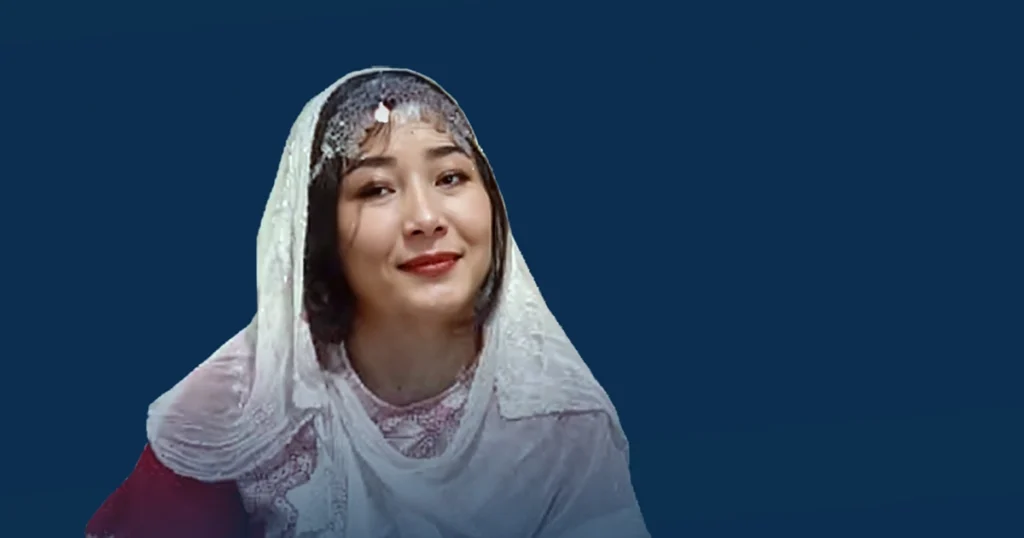
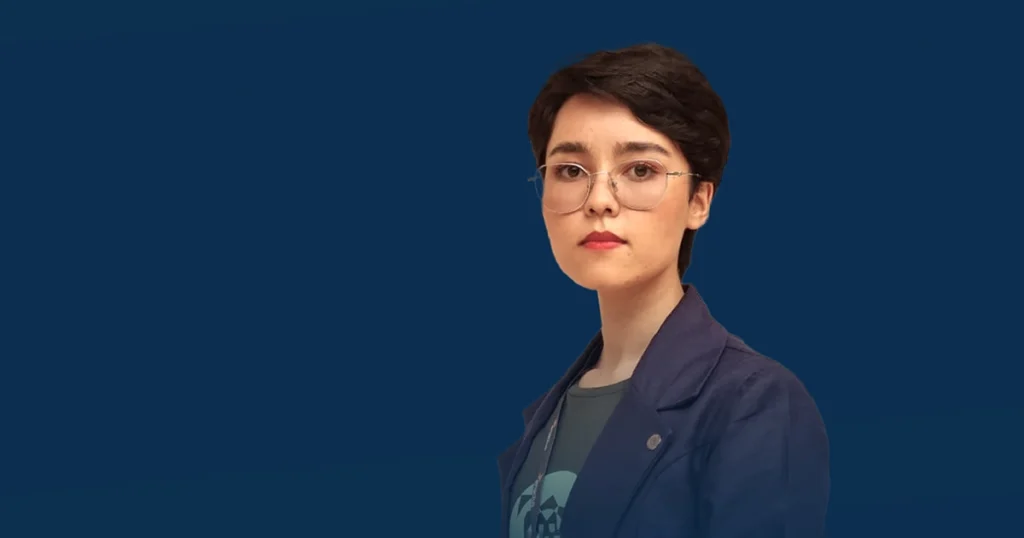
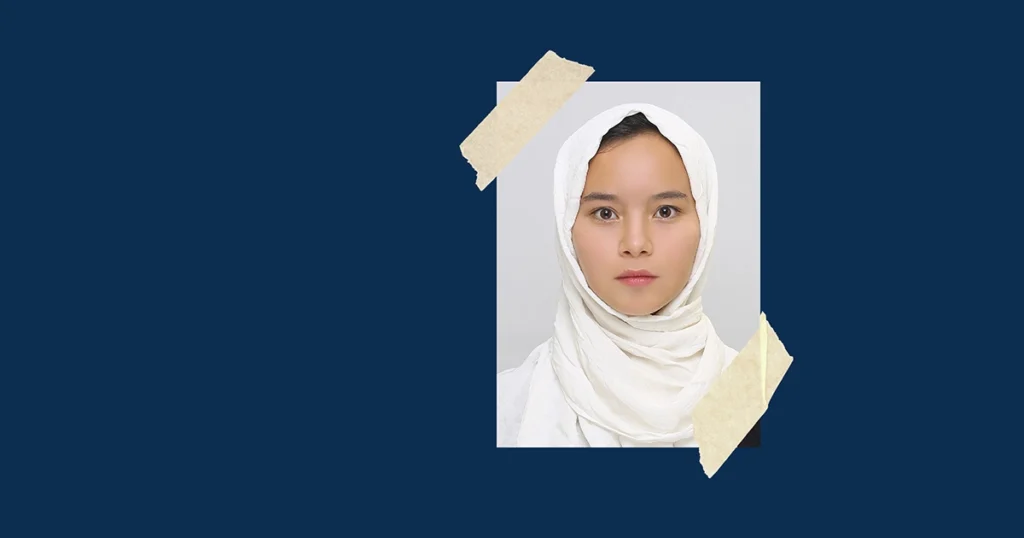
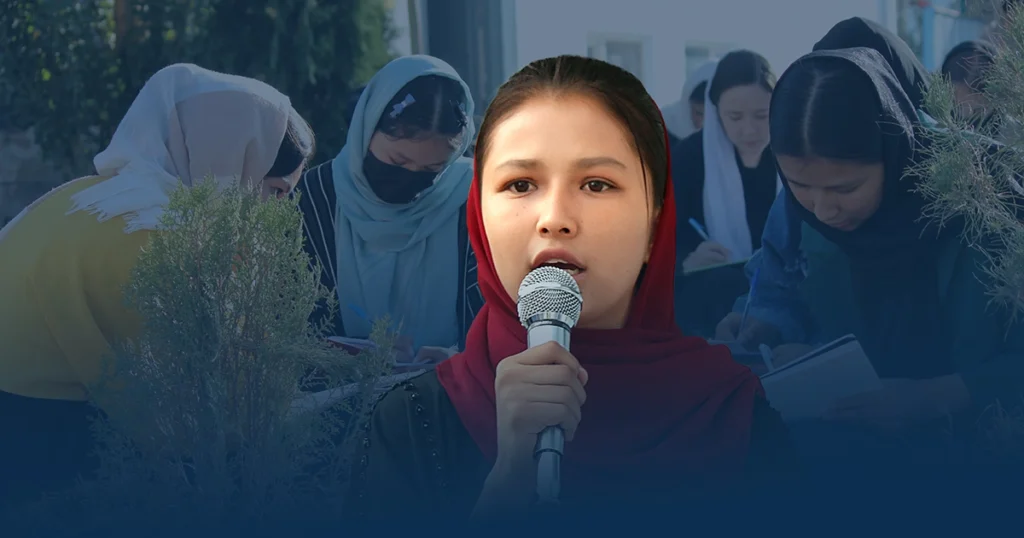
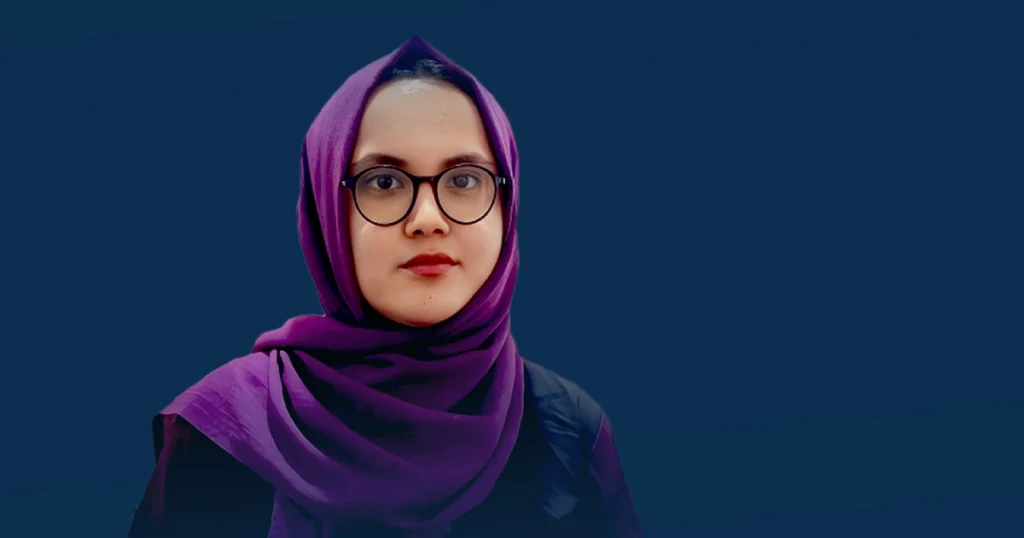

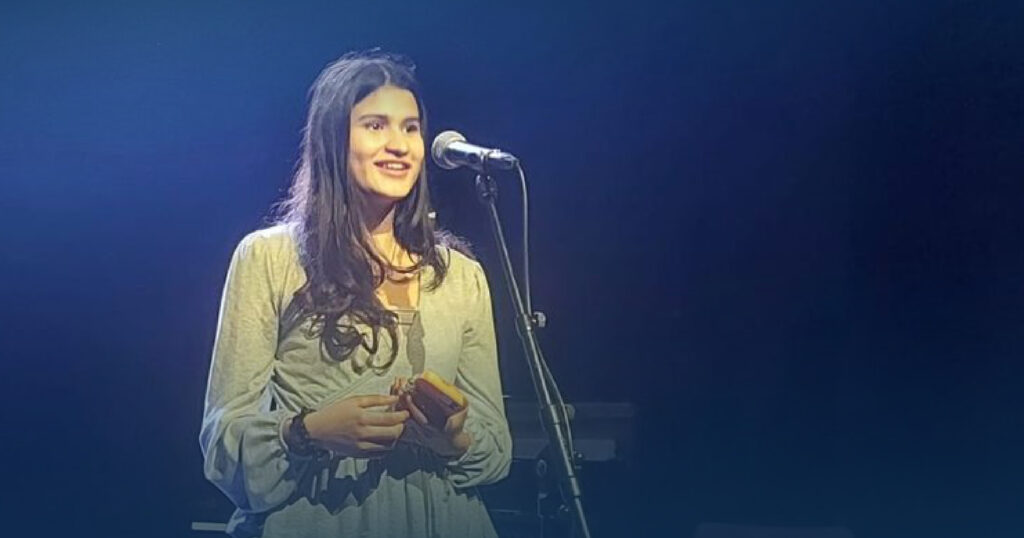

Comments (0)
Leave a Comment